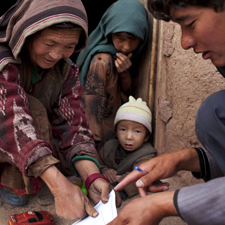Demographic data are fundamental to developing and assessing social and economic policies, including those focused on poverty reduction, and they provide an essential evidence base for national and local policymakers. The need for high-quality, timely, reliable and relevant demographic data has gained prominence in light of the recent adoption of the 2030 Agenda for Sustainable Development, in which population-related issues underpin many of the goals and targets.
It is therefore quite timely that the theme of the Commission on Population and Development in 2016 is “Strengthening the demographic evidence base for the post-2015 development agenda”.
The upcoming session of the Commission will consider this topic from 11 to 15 April at UN Headquarters in New York. It is expected that the discussions will focus on the critical importance of demographic data and analysis for achieving sustainable development and for ensuring that no one is left behind, and on how the demographic evidence base can be strengthened to help achieve the objectives of the 2030 Agenda.
Discussions and negotiations on the annual theme, informed by two recent reports of the Secretary-General, will capture the attention of members of the Commission and of a wide range of stakeholders, including many from civil society. In addition, there will be keynote presentations and panel discussions, as well as a variety of side-events, which will enhance and enrich the discussions.
Birth registration establishes legal identity for all persons
Administrative data systems, including civil registration and population registers, are a key source of statistics on fertility, mortality and migration. Birth registration is also important as a means of establishing legal identity for all persons.
However, administrative data are often lacking in developing countries. Strengthening the human capacity for building and maintaining such data systems will require increased political will and commitment from the countries themselves, as well as enhanced support from donors and the international community.

Collecting demographic data via censuses and household surveys
Other techniques for the collection of demographic data include censuses and household surveys. Governments should ensure that all countries participate in the 2020 round of population censuses, so that the entire population is enumerated and its basic characteristics are recorded at least once per decade.
By leveraging advances in information and communication technologies, it is possible to improve the efficiency of data collection and processing. Likewise, Governments should strengthen nationwide household survey programmes by reinforcing the capacity of national statistical offices to collect such data.
Data disaggregation essential for social inclusion
For all methods of data collection, data disaggregation is essential in order to respond effectively to the imperative for social inclusion emphasized in the 2030 Agenda.
Ideally, demographic data and estimates should be disaggregated by income, gender, age, race, ethnicity, migratory status, disability, geographic location and other characteristics relevant in national contexts.
In addition, the geographic coordinates associated with each observation should be recorded and included in publicly accessible data sets, where possible, to allow disaggregation by location. Geo-referenced micro-data offer considerable flexibility in the specification of the geographic units that are used for a particular analysis and greatly enhance the opportunities for examining a given topic from the perspective of the most-affected groups.
Strengthening the demographic evidence base at the global level
Both big data and open-data initiatives provide important opportunities for making use of non‑traditional data sources. However, it is essential for producers and Governments to develop rigorous protocols for protecting the privacy of individuals and safeguarding the confidentiality of the information.
Finally, the United Nations has an important role to play in strengthening the demographic evidence base at the global level. It is expected that the various departments, agencies, funds and programmes of the United Nations system will continue to collaborate in harmonizing estimates, improving estimation methods, and reporting on progress at the regional and global levels, while at the same time working to enhance national capacities for the production and use of high-quality demographic data.
Follow the discussion on Twitter using the hashtags #CPD49 and #UNPopulation. The plenary session will also be broadcast live via UN Web TV.

